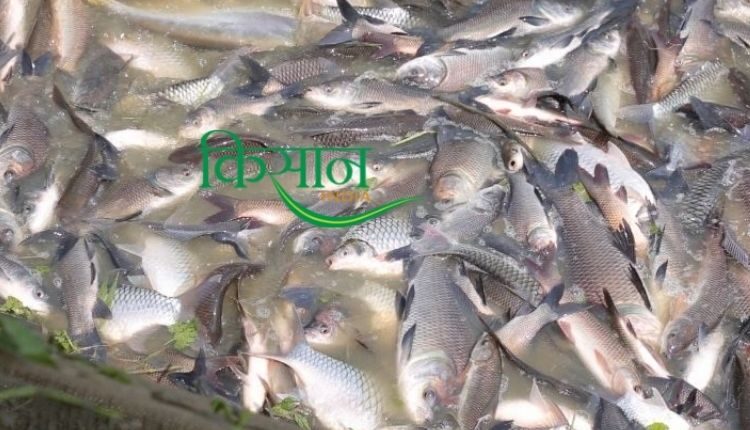Mukesh Dhakad, a resident of Alinagar village in Vidisha district of Madhya Pradesh, is an inspirational farmer who is working towards improving his income and environment through organic farming and fisheries. Owning 16-20 acres of land, Mukesh is trying to change the traditional concepts of farming by adopting modern methods and organic farming methods. He also has a pond which he wants to use for fish farming.
Start of Organic Farming
Mukesh says,
“The use of chemicals in farming had increased a lot, which was affecting the fertility and health of the land. I chose organic farming because it is not only beneficial for the environment, but it also improves the quality and market value of the crop.”
Mukesh uses organic manure, vermi-compost and organic pesticides in his fields. He mainly cultivates wheat, gram, soybean and maize through organic methods.
Interest in fisheries
Mukesh’s pond, which is spread over one bigha of land, inspired him to explore the possibilities of fisheries. He says, “Fisheries will not only increase income but it can also become a means of providing employment to many other people associated with agriculture.”
Mukesh plans to use advanced techniques and selection of the right species for fisheries. He wants to combine the process of fisheries with organic methods, which will improve the quality of water and fish.
Benefits of organic farming
After Mukesh adopted organic farming, not only did environmental damage reduce but the demand for his crop also increased. High demand and better prices of organic products in the market increased his income.
Key benefits:
1. Improved soil quality: Soil fertility increased due to the use of organic manure and natural methods.
2. Water saving: Use of micro-irrigation and organic methods for crops.
3. Healthy products: Due to chemical-free crops, there is a high demand for his products among consumers.
Struggle and learning
Mukesh Dhakad’s journey to organic farming was not easy. When he started organic farming, leaving traditional farming, he had to face many challenges. The biggest problem was the lack of market for chemical-free farming. It was difficult to correctly identify organic products and find permanent customers for them. Apart from this, crop production was also relatively low in the beginning, due to which he suffered financial losses.
Mukesh says,
“When I started organic farming, it seemed very less compared to the income from traditional farming. I wondered many times whether I had chosen the right path. But gradually I realized that organic farming is not only better for the environment, but is also more economically beneficial in the long run.”
Mukesh contacted many agricultural scientists and local agricultural officials during this time. He gathered information about new techniques and market prospects of organic farming. He started using cow dung and vermicompost manure in the fields, which increased soil fertility and improved production. Along with this, he formed a small group with local farmers, which collectively sells organic farming products in the market.
Lessons learned from experience
Mukesh says,
“Organic farming requires both patience and hard work. Results are slow in the beginning, but in the long run its benefits are clear. I learned that organic products can be properly valued only when we are able to explain its benefits to consumers.”
His biggest learning was that along with improving the quality of the products, it is also important to make consumers aware of their importance. He made efforts to sell his products in both local and online markets. The result of his hard work was that he created a permanent market for his organic products. Now his customers not only come from the local market, but the demand for his products is also increasing from big cities.
This journey of Mukesh shows that no new initiative is successful without struggle. His success in organic farming is proof that any challenge can be overcome with determination and hard work.
Benefits of government schemes
Although Mukesh has not yet availed any government scheme, he plans to join schemes like “Pradhan Mantri Kisan Samman Nidhi” and “Mission Organic Value Chain Development”. Along with this, he is also working towards taking advantage of “Pradhan Mantri Matsya Sampada Yojana” for fisheries.
Inspiration to the community
Mukesh has shown farmers through his efforts that self-sufficiency is possible through organic farming and fisheries even in less land. His workshops and experience-sharing sessions have inspired many farmers to change their methods. Mukesh believes, “If we do eco-friendly farming, a healthy future will be ensured for our next generation.”
Future plans
Mukesh plans to implement advanced fisheries techniques in his pond and develop a larger market for organic products. He says, “I want my products to reach not only local markets, but also other parts of the country. The combination of organic farming and fisheries will definitely increase the income of farmers.”
Mukesh Dhakad’s story is an inspiration for all those farmers who want to move out of traditional farming and adopt organic and natural methods. His vision, hard work and new experiments are a sign of bringing positive change in the agriculture sector. His journey shows how sustainable options like organic farming and fisheries can not only save the environment but also improve the economic condition of farmers.
Contact us- If farmers want to share any valuable information or experiences related to farming, they can connect with us via phone or whatsApp at 9599273766 or you can write to us at [email protected]. Through Kisan of India, we will convey your message to the people, because we believe that if the farmers are advanced then the country is happy.
You can connect with Kisan of India on Facebook, Twitter, and WhatsApp and Subscribe to our YouTube channel.



